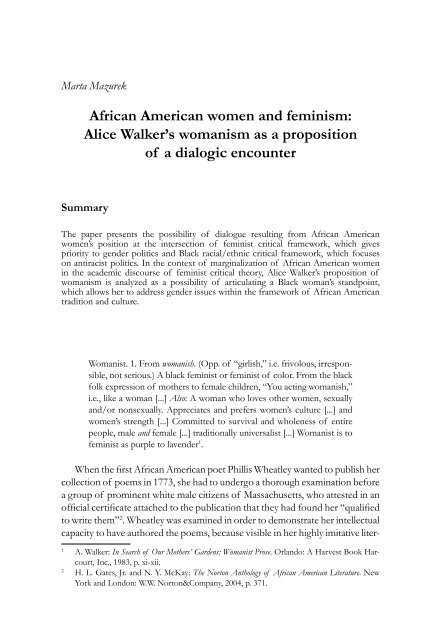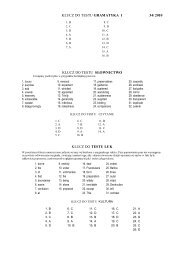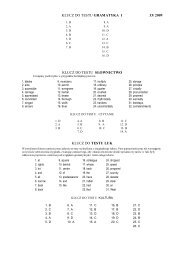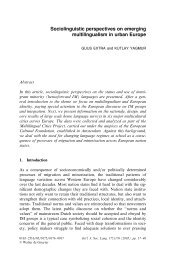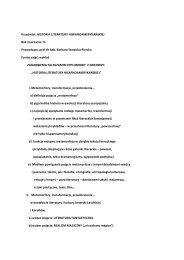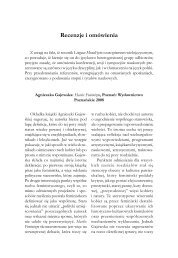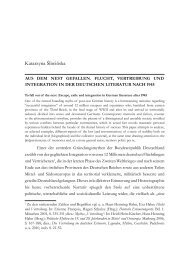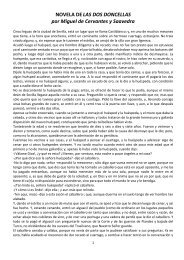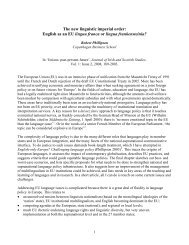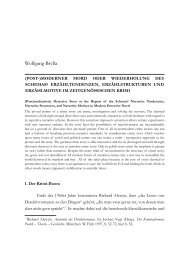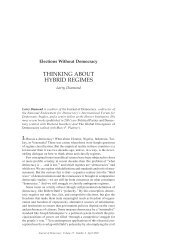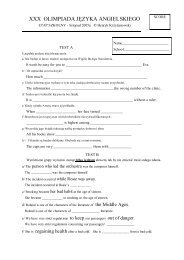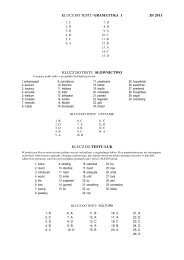African American women and feminism: Alice Walker's womanism ...
African American women and feminism: Alice Walker's womanism ...
African American women and feminism: Alice Walker's womanism ...
Create successful ePaper yourself
Turn your PDF publications into a flip-book with our unique Google optimized e-Paper software.
Marta Mazurek<br />
<strong>African</strong> <strong>American</strong> <strong>women</strong> <strong>and</strong> <strong>feminism</strong>:<br />
<strong>Alice</strong> Walker’s <strong>womanism</strong> as a proposition<br />
of a dialogic encounter<br />
Summary<br />
The paper presents the possibility of dialogue resulting from <strong>African</strong> <strong>American</strong><br />
<strong>women</strong>’s position at the intersection of feminist critical framework, which gives<br />
priority to gender politics <strong>and</strong> Black racial/ethnic critical framework, which focuses<br />
on antiracist politics. In the context of marginalization of <strong>African</strong> <strong>American</strong> <strong>women</strong><br />
in the academic discourse of feminist critical theory, <strong>Alice</strong> Walker’s proposition of<br />
<strong>womanism</strong> is analyzed as a possibility of articulating a Black woman’s st<strong>and</strong>point,<br />
which allows her to address gender issues within the framework of <strong>African</strong> <strong>American</strong><br />
tradition <strong>and</strong> culture.<br />
Womanist. 1. From womanish. (Opp. of “girlish,” i.e. frivolous, irresponsible,<br />
not serious.) A black feminist or feminist of color. From the black<br />
folk expression of mothers to female children, “You acting womanish,”<br />
i.e., like a woman [...] Also: A woman who loves other <strong>women</strong>, sexually<br />
<strong>and</strong>/or nonsexually. Appreciates <strong>and</strong> prefers <strong>women</strong>’s culture [...] <strong>and</strong><br />
<strong>women</strong>’s strength [...] Committed to survival <strong>and</strong> wholeness of entire<br />
people, male <strong>and</strong> female [...] traditionally universalist [...] Womanist is to<br />
feminist as purple to lavender .<br />
When the first <strong>African</strong> <strong>American</strong> poet Phillis Wheatley wanted to publish her<br />
collection of poems in 1773, she had to undergo a thorough examination before<br />
a group of prominent white male citizens of Massachusetts, who attested in an<br />
official certificate attached to the publication that they had found her “qualified<br />
to write them” . Wheatley was examined in order to demonstrate her intellectual<br />
capacity to have authored the poems, because visible in her highly imitative liter-<br />
<br />
<br />
A. Walker: In Search of Our Mothers’ Gardens: Womanist Prose. Orl<strong>and</strong>o: A Harvest Book Harcourt,<br />
Inc., 1983, p. xi-xii.<br />
H. L. Gates, Jr. <strong>and</strong> N. Y. McKay: The Norton Anthology of <strong>African</strong> <strong>American</strong> Literature. New<br />
York <strong>and</strong> London: W.W. Norton&Company, 2004, p. 371.
10 Marta Mazurek<br />
ary production mastery of the Bible <strong>and</strong> the poetry of Milton, Pope <strong>and</strong> Gray was<br />
contrary to the eighteenth-century conviction that Black slaves were naturally unable<br />
to create literature, which proved their sub-human position in the chain of beings<br />
<strong>and</strong> justified the institution of slavery in America. Two hundred <strong>and</strong> twenty years<br />
after the first <strong>African</strong> <strong>American</strong> woman proved her humanity by writing poetry, the<br />
first <strong>African</strong> <strong>American</strong> woman Toni Morrison received the Nobel Prize in Literature<br />
for the outst<strong>and</strong>ing value of her creative writing. Morrison’s novels are not art for<br />
art’s sake, as she claims, but they are tightly linked to the culture <strong>and</strong> history of her<br />
community. “I write [...] village literature, fiction that is really for the village, for the<br />
tribe”, she asserts, adding that her novels “should clarify the roles that have become<br />
obscured; they ought to identify those things in the past that are useful <strong>and</strong> those<br />
things that are not; <strong>and</strong> they ought to give nourishment” . In order to write literature<br />
deeply rooted in the <strong>African</strong> <strong>American</strong> culture of her community, she incorporates<br />
the major characteristics of Black art, that is oral quality, a choral note, myth, music,<br />
folklore <strong>and</strong>, most importantly, the trope of the ancestor <strong>and</strong> memory .<br />
As many other <strong>African</strong> <strong>American</strong> <strong>women</strong> writers, Morrison asserts that she<br />
situates herself within the <strong>African</strong> <strong>American</strong> community <strong>and</strong> its tradition of resisting<br />
discrediting views of the dominant society rather that aligns herself with<br />
the Black feminist model of critical inquiry, “because any model of criticism that<br />
excludes males from it is as hampered as any model of criticism of Black literature<br />
that excludes <strong>women</strong> from it” . Morrison’s assertion implies that for an <strong>African</strong><br />
<strong>American</strong> woman writer it is more important to create for the nourishment of<br />
the <strong>African</strong> <strong>American</strong> community including both men <strong>and</strong> <strong>women</strong> than separate<br />
herself from it by assuming a Black feminist stance. Discernible in the essay<br />
Rootedness: The Ancestor as Foundation is her choice to remain loyal to the politics<br />
of Black nationalism/ethnicity <strong>and</strong> the rejection of Black <strong>feminism</strong> as separating<br />
<strong>African</strong> <strong>American</strong> <strong>women</strong> from men. Moreover, Afrocentric values that permeate<br />
the <strong>African</strong> <strong>American</strong> family, community, religion <strong>and</strong> culture point to a value<br />
system that existed before <strong>and</strong> independently of the system of racial domination,<br />
<strong>and</strong> reliance on Afrocentric tradition, that is precisely on what differentiates the<br />
<strong>African</strong> <strong>American</strong> community from other communities, seems to be particularly<br />
empowering for Morrison, as it is for her characters.<br />
<strong>African</strong> <strong>American</strong> <strong>women</strong>’s anxiety caused by their necessity to choose loyalties,<br />
as Morrison did in her essay, stems from an apparent conflict between feminist<br />
critical framework <strong>and</strong> <strong>African</strong> <strong>American</strong> unity. On the basis of a selection of<br />
<br />
T. LeClair: The Language Must Not Sweat: A Conversation with Toni Morrison. “New Republic” 1981,<br />
184, p. 26.<br />
<br />
T. Morrison: Rootedness: The Ancestor as Foundation. In: What Moves at the Margin. Ed. C. C. Denard.<br />
Jackson: University Press of Mississippi, 2008, p. 61.<br />
<br />
T. Morrison: Rootedness: The Ancestor as Foundation, op.cit., p. 64.
<strong>African</strong> <strong>American</strong> <strong>women</strong> <strong>and</strong> <strong>feminism</strong>: <strong>Alice</strong> Walker’s <strong>womanism</strong> as a proposition of a dialogic encounter 11<br />
<strong>African</strong> <strong>American</strong> <strong>women</strong>’s critical essays this paper demonstrates how <strong>Alice</strong><br />
Walker’s proposition of the womanist critical (<strong>and</strong> practical) perspective might<br />
serve the politics of reconciliation rather than radical separation from <strong>feminism</strong><br />
without the necessity to give up commitment to uphold the unity of the <strong>African</strong><br />
<strong>American</strong> community. The presented improvisational analysis of <strong>Alice</strong> Walker’s<br />
essay In Search of Our Mothers’ Gardens aims to demonstrate <strong>womanism</strong>’s potential<br />
of employing the politics of a friendly dialogue with <strong>feminism</strong> to both support<br />
feminist politics <strong>and</strong> assert its uniqueness by stressing <strong>womanism</strong>’s rootedness<br />
in <strong>African</strong> <strong>American</strong> tradition <strong>and</strong> culture.<br />
Locating <strong>African</strong> <strong>American</strong> <strong>women</strong>’s st<strong>and</strong>point<br />
Responding to the dominant <strong>and</strong> universalizing academic discourse of poststructuralist<br />
theory in the 1980s, Black feminist critic Barbara Christian articulated<br />
her disappointment with – <strong>and</strong> the feeling of being “intimidated, devalued” by<br />
– the intellectual hegemony of Euro-<strong>American</strong> abstract logic that surrounded the<br />
definition of knowledge in the academia . As a woman of color she felt excluded<br />
by what she called “the race for theory”, which she saw as the “takeover” of white<br />
philosophers who had “reinvented the meaning of theory”, seeing that the world<br />
was “fast escaping their political control” . According to her, the popularization<br />
of Western abstract theory as constitutive for the definition of knowledge in<br />
the academia was alien to emerging literatures created by people who struggled<br />
to be heard, that is people of color, feminists, radical critics <strong>and</strong> creative writers.<br />
Christian felt particularly discouraged by the incomprehensibility of the language<br />
of theory, its prescriptiveness <strong>and</strong> the tendency to relegate to a marginal position<br />
of “minority discourse” those <strong>African</strong> <strong>American</strong> writers for whom “literature is<br />
not an occasion for discourse among critics but is necessary nourishment of their<br />
people <strong>and</strong> one way by which they come to underst<strong>and</strong> their lives better” .<br />
In her critique of “the race for theory”, Christian also indicates that in their<br />
effort to follow the injunction to theorize – <strong>and</strong> thus legitimize their place in the<br />
academia – feminists exclude <strong>women</strong> of color who have always theorized, but<br />
their notion of theory does not necessarily converge with what is considered<br />
academic theory. Consequently, her statement: “my folk [...] have always been<br />
a race for theory” may be interpreted, on the one h<strong>and</strong>, as pointing to mar-<br />
<br />
B. Christian: The Race for Theory. In: <strong>African</strong> <strong>American</strong> Literary Theory: A Reader. Ed. W. Napier.<br />
New York <strong>and</strong> London: New York University Press, 2000, p. 280.<br />
<br />
B. Christian: The Race for Theory, op.cit., p. 280.<br />
<br />
B. Christian: The Race for Theory, op.cit., p. 282.<br />
<br />
Ibid.
12 Marta Mazurek<br />
ginalization of people of color by the dominant theoretical discourse; on the<br />
other h<strong>and</strong>, it is claiming recognition for <strong>African</strong> <strong>American</strong> <strong>women</strong>’s thought as<br />
a legitimate source <strong>and</strong> form of knowledge. More particularly, Christian’s assertion<br />
voiced criticism of globalizing gestures of feminist thought which insisted on the<br />
unified identity of “woman”, basing the construction of this category on shared<br />
experience of gender oppression instead of recognizing multiple cultural, social<br />
<strong>and</strong> political intersections which define <strong>women</strong>’s experience.<br />
Christian’s “controversial essay” 10 can be understood as a gesture of separation<br />
from <strong>and</strong> rejection of the academic theoretical discourse of the 1980s,<br />
as well as a call for opening up space for reconceptualizing Eurocentric epistemologies<br />
<strong>and</strong> revealing new ways of knowledge which would allow <strong>African</strong><br />
<strong>American</strong> <strong>women</strong> to define their own experience. By stating that Black <strong>women</strong>’s<br />
theorizing “is often in narrative forms, in the stories [they] create, in riddles<br />
<strong>and</strong> proverbs, in the play with language [...] celebrated in the works of writers<br />
such as Toni Morrison <strong>and</strong> <strong>Alice</strong> Walker” 11 , Christian postulates what might be<br />
called a risky reversal of the theory/creative writing opposition. By repeating<br />
the gesture of postmodern philosophers who abolish the opposition between<br />
theoretical <strong>and</strong> literary texts, she invites <strong>African</strong> <strong>American</strong> <strong>women</strong> critics to<br />
treat creative writing as theory.<br />
Despite the fact that Deborah E. McDowell critiques Christian’s reversal of<br />
“theory/creative [writing] binarism in order to claim for the literatures of ‘people<br />
of color’ status as ‘theory’” as still giving “primacy to ‘theory’” 12 , the latter’s proposal<br />
might be understood as a shift toward embracing Afrocentric feminist epistemology<br />
in analyzing <strong>African</strong> <strong>American</strong> <strong>women</strong>’s literary output (also postulated by<br />
Barbara Smith over a decade earlier). Such a traditional Afrocentric underst<strong>and</strong>ing<br />
of the connections of knowledge, consciousness <strong>and</strong> the politics of empowerment<br />
focuses on “Black <strong>women</strong> as agents of knowledge”, that is it concentrates<br />
on such <strong>women</strong> as “blues singers, poets, autobiographers, story tellers, <strong>and</strong> orators<br />
validated by everyday Black <strong>women</strong> as experts on a Black <strong>women</strong>’s st<strong>and</strong>point” 13 .<br />
Consequently, <strong>African</strong> <strong>American</strong> <strong>women</strong>’s thought, which represents – to use the<br />
Foucauldian term – subjugated knowledge as well as their long-st<strong>and</strong>ing culture<br />
of resistance to the situation of oppression, forms what Donna Haraway labeled<br />
situated knowledge, challenging the superiority <strong>and</strong> truth claims of Eurocentric<br />
<strong>and</strong> masculinists disembodied <strong>and</strong> detached observation in favor of underst<strong>and</strong>ing<br />
that is partial, embodied <strong>and</strong> located in a specific context.<br />
10<br />
D. E. McDowell: The “Practice” of “Theory”. In: <strong>African</strong> <strong>American</strong> Literary Theory: A Reader. Ed. W.<br />
Napier. New York <strong>and</strong> London: New York University Press, 2000, p. 575.<br />
11<br />
B. Christian: The Race for Theory, op.cit., p. 281.<br />
12<br />
D. E. McDowell: The “Practice” of “Theory”, op.cit., p. 579.<br />
13<br />
P. H. Collins: Black Feminist Thought. New York & London: Routledge, 1990, p. 230, 231.
<strong>African</strong> <strong>American</strong> <strong>women</strong> <strong>and</strong> <strong>feminism</strong>: <strong>Alice</strong> Walker’s <strong>womanism</strong> as a proposition of a dialogic encounter 13<br />
In 1990 Black sociologist Patricia Hill Collins pointed to the revolutionary<br />
potential of placing <strong>African</strong> <strong>American</strong> <strong>women</strong>’s experience at the center of analysis<br />
of processes of domination in the redefinition of “either/or dichotomous<br />
thinking of Eurocentric, masculinist thought” 14 . This role is crucial due to the<br />
fact that <strong>African</strong> <strong>American</strong> <strong>women</strong> are most profoundly affected by the interlocking<br />
systems of race, class <strong>and</strong> gender oppression “within a more generalized<br />
matrix of domination” 15 . <strong>African</strong> <strong>American</strong> <strong>women</strong>’s experience of oppression<br />
rejects the possibility of applying additive models, that is of analyzing race, class<br />
<strong>and</strong> gender as competing hierarchical frameworks for analyzing oppression (as<br />
racist <strong>and</strong> economic <strong>and</strong> sexist) but calls for a new theoretical framework of<br />
intersectionality, which is a paradigm viewing race, class <strong>and</strong> gender (sexuality,<br />
age <strong>and</strong> ethnicity might be added here) as mutually constructing systems of<br />
power, which both shape <strong>and</strong> are shaped by <strong>African</strong> <strong>American</strong>s 16 . Assuming<br />
the intersectional paradigm has allowed Collins to analyze how excluded groups<br />
of <strong>African</strong> <strong>American</strong>s may be penalized <strong>and</strong> simultaneously enjoy privilege<br />
depending on the context. For example, Black men may be penalized by their<br />
race but are privileged by gender in their race, while white <strong>women</strong> are penalized<br />
by their gender but are privileged by their race. Consequently, an individual<br />
might be a member of an oppressor <strong>and</strong> an oppressed group at the same time.<br />
Black feminist critics, for example, are penalized by their race <strong>and</strong> gender but<br />
they are simultaneously privileged by their class (as is sometimes pointed out<br />
by womanist <strong>and</strong> <strong>African</strong>a critics).<br />
On the one h<strong>and</strong>, this particularly vulnerable, intersectional position of <strong>African</strong><br />
<strong>American</strong> <strong>women</strong> has made it necessary for them to constantly interrogate<br />
feminist thought which has colonized colored <strong>women</strong> in the gender framework<br />
that neglects the role of racism. On the other h<strong>and</strong>, they interrogate <strong>African</strong><br />
<strong>American</strong> antiracist politics which gives priority to “race as a consensus issue<br />
[because it affects all group members] while assigning gender <strong>and</strong> sexuality<br />
a secondary status as crosscutting issues [because they affect only certain segments<br />
of the group]” 17 . As a result, <strong>African</strong> <strong>American</strong> <strong>women</strong> are engaged in<br />
a dialogic relation with feminists (as <strong>women</strong> <strong>and</strong> as colored persons) <strong>and</strong> with<br />
Black men (as colored persons <strong>and</strong> as <strong>women</strong>), simultaneously <strong>and</strong> respectively<br />
affirming identity with <strong>and</strong> asserting difference from both groups which assign<br />
colored <strong>women</strong> marginal positions in their discourses <strong>and</strong> politics 18 .<br />
14<br />
P. H. Collins: Black Feminist Thought, op.cit., p. 225.<br />
15<br />
P. H. Collins: Black Feminist Thought, op.cit., p. 226.<br />
16<br />
P. H. Collins: Black Sexual Politics. New York & London: Routledge, 2005, p. 351.<br />
17<br />
P. H. Collins: Black Sexual Politics, op.cit., p. 47.<br />
18<br />
M. G. Henderson: Speaking in Tongues: Dialogics, Dialectics, <strong>and</strong> the Black Woman Writer’s Literary<br />
Tradition. In: <strong>African</strong> <strong>American</strong> Literary Theory: A Reader. Ed. W. Napier. New York <strong>and</strong> London:<br />
New York University Press, 2000, pp. 348-368.
14 Marta Mazurek<br />
Drawing on the selected propositions voiced by Christian, Collins <strong>and</strong> Henderson,<br />
I will analyze the implications following from the dialogic position of<br />
a womanist as an outsider-within, which <strong>Alice</strong> Walker first assumed in an effort<br />
to creatively re-articulate a Black woman’s st<strong>and</strong>point <strong>and</strong> engage in dialogue in<br />
her commitment “to survival <strong>and</strong> wholeness of entire people, male <strong>and</strong> female” 19 .<br />
Very helpful in this analysis is the anthology titled The Womanist Reader – a much<br />
needed “compendium of womanist scholarship”, documenting over a quarter<br />
century of womanists’ creative <strong>and</strong> scholarly output, as the editor <strong>and</strong> contributor<br />
Layli Phillips asserted in her illuminating introductory analysis 20 .<br />
Phillips associates the absence of any systematic treatment of <strong>womanism</strong><br />
with two phenomena, namely the exhaustion of the debates within feminist<br />
critical theory at the end of the 1990s, which foreclosed the possibility of any<br />
serious discussion on the significance of this perspective for academic <strong>feminism</strong>.<br />
Moreover, the fact that <strong>womanism</strong> has been widely employed rather intuitively<br />
than analytically since the mid-1980s outside the academia resulted in its transformation<br />
into “a venerable <strong>and</strong> persistent underground movement” 21 . The lack<br />
of a systematic theoretical analysis of <strong>womanism</strong> on the one h<strong>and</strong> contributed<br />
to its resistance to canonization <strong>and</strong> accessibility to people living in different<br />
cultural context, which also proves its productivity <strong>and</strong> relevance as a “polyvalent,<br />
polyvocal, dialogic, noncentralized <strong>and</strong> improvisational” perspective 22 . On<br />
the other h<strong>and</strong>, however, <strong>womanism</strong> became less visible <strong>and</strong> misunderstood as<br />
merely a version of <strong>feminism</strong>.<br />
Additionally, what may have discouraged feminist critics from embracing<br />
<strong>womanism</strong> as an acceptable academic proposition in the 1980s <strong>and</strong> 1990s was its<br />
endorsement of Black nationalist assumptions <strong>and</strong> racial separation from (white)<br />
<strong>feminism</strong>, which seems to be implied in Walker’s distinction between “womanish”,<br />
that is responsible, mature <strong>and</strong> serious, associated with black <strong>women</strong>, <strong>and</strong> “girlish”,<br />
that is “frivolous, irresponsible, not serious”, associated with feminists 23 . Moreover,<br />
womanists’ “vernacular loyalties <strong>and</strong> grassroots sensibilities”, accessible language<br />
<strong>and</strong> explicitly spiritual character excluded them from the academic discourse of<br />
poststructuralism despite the fact that they propose building community around<br />
lines of affinity – a feature which allows Phillips to call <strong>womanism</strong> “postmodernism<br />
at street level” 24 . Phillips admits that some womanists, labeled “race <strong>women</strong>”, do<br />
19<br />
A. Walker: In Search of Our Mothers’ Gardens: Womanist Prose. Orl<strong>and</strong>o: A Harvest Book Harcourt,<br />
Inc., 1983, p. xi.<br />
20<br />
L. Phillips: The Womanist Reader. New York <strong>and</strong> London: Routledge, 2006, p. xix.<br />
21<br />
L. Philips: The Womanist Reader, op.cit., p. xix.<br />
22<br />
L. Phillips: The Womanist Reader, op.cit., p. xxi.<br />
23<br />
P. H. Collins: What’s in a Name? Womanism, Black Feminism, <strong>and</strong> Beyond. In: The Womanist Reader.<br />
Ed. L. Phillips, op.cit., p. 59.<br />
24<br />
L. Phillips: The Womanist Reader, op.cit., p. xxx, xxxii.
<strong>African</strong> <strong>American</strong> <strong>women</strong> <strong>and</strong> <strong>feminism</strong>: <strong>Alice</strong> Walker’s <strong>womanism</strong> as a proposition of a dialogic encounter 15<br />
place their anti-sexist politics within Black cultural framework rather than align<br />
it with feminist framework; however, their position should be seen as antiracist<br />
rather than antifeminist 25 . Womanism <strong>and</strong> <strong>feminism</strong> can be then viewed as potentially<br />
mutually supportive rather than exclusive or competitive.<br />
The assumption that it is possible for <strong>womanism</strong> to reconcile feminist <strong>and</strong><br />
Black nationalist perspectives can be discerned in dialogue, which is one of the<br />
womanist methods of social transformation aiming at collective well-being. Dialogue,<br />
“by which people express <strong>and</strong> establish both connection <strong>and</strong> individuality”,<br />
is “a site for both struggle <strong>and</strong> love” <strong>and</strong> is associated with the kitchen table<br />
metaphor, which connotes the woman in the centre, nourishment, egalitarianism,<br />
interpersonal relations <strong>and</strong>, last but not least, informality 26 . The kitchen table<br />
metaphor very neatly underscores the vernacular character of <strong>womanism</strong>, which<br />
Phillips connects with “the every day” 27 , possibly echoing <strong>Alice</strong> Walker’s first use<br />
of the term “womanist” in her 1979 story Coming Apart. In the story, Walker’s<br />
narrator states the following: “The wife has never considered herself a feminist<br />
– though she is, of course, a ‘womanist’. A ‘womanist’ is a feminist, only more<br />
common” 28 . This emphasis on the “common” aspect points to the womanist perspective<br />
as one that results from the suppression of <strong>African</strong> <strong>American</strong> <strong>women</strong>’s<br />
self-definition in traditional sites of knowledge, which relegated the expression<br />
of Black <strong>women</strong>’s consciousness to such “alternative sites as music, literature,<br />
daily conversation, <strong>and</strong> everyday behavior” 29 . However, dialogue as a womanist<br />
method may also be considered as acknowledging the <strong>African</strong> presence in<br />
<strong>African</strong> <strong>American</strong> culture, which insists on the <strong>African</strong>-based call-<strong>and</strong>-response<br />
dialogic pattern preserved in the Black vernacular oral tradition.<br />
Making Woolf ’s text speak<br />
<strong>Alice</strong> Walker’s 1974 title essay of the collection In Search of Our Mothers’ Gardens<br />
is an example of a dialogic re-visioning of Woolf ’s A Room of One’s Own, through<br />
which the colored woman both asserts her difference from the Eurocentric<br />
category of “woman”, that is – to use Henderson’s distinction – enters into<br />
dialogue of contestation, <strong>and</strong> acknowledges affinity with Woolf, that is enters<br />
into dialogue of affirmation, to signify her position. Consequently, Walker’s<br />
essay might be read as a womanist “kitchen table” dialogue, to which Woolf is<br />
25<br />
L. Phillips: The Womanist Reader, op.cit., p. xxxiv.<br />
26<br />
L. Phillips: The Womanist Reader, op.cit., p. xxvii.<br />
27<br />
L. Phillips: The Womanist Reader, op.cit., p. xxiv.<br />
28<br />
A. Walker: Coming Apart. In: The Womanist Reader. Ed. L. Phillips, op.cit., p. 7.<br />
29<br />
P. H. Collins: Black Feminist Thought, op.cit., p. 202.
16 Marta Mazurek<br />
invited <strong>and</strong> in which she plays a part equal to those of other <strong>African</strong> <strong>American</strong><br />
female participants. The rhetorical gesture performed by Walker invoking the<br />
feminist icon is as “outrageous, audacious [<strong>and</strong>] courageous” as the womanist<br />
herself, according to Walker’s definition 30 ; however, it cannot be interpreted in<br />
terms of a reversed (<strong>and</strong> thus matriarchal) pattern of Bloom’s theory of literary<br />
tradition known as anxiety of influence.<br />
Walker’s incorporation of the well-known fragments of Woolf ’s canonical<br />
text into her own critical production is a strategy which Henry Louis Gates, Jr.<br />
defined as “Signifyin(g)” – “generated from within the black tradition itself [...]<br />
a metaphor for formal revision, or intertextuality, within the Afro-<strong>American</strong> literary<br />
tradition” 31 . In other words, Walker’s essay might be understood as a translation, or<br />
a repetition with a difference, of Woolf ’s text, with which it has a lot in common,<br />
<strong>and</strong> through/against which Walker asserts herself. This strategy can be illustrated<br />
on the basis of the following passage as an example:<br />
Virginia Woolf wrote further, speaking of course not of our Phillis [Wheatley],<br />
that ‘any woman born with a great gift in the sixteenth century [insert<br />
‘eighteenth century’, insert ‘black woman’, insert ‘born or made a slave’]<br />
would certainly have gone crazed, shot herself, or ended her days in some<br />
lonely cottage outside the village, half witch, half wizard [insert ‘Saint’],<br />
feared <strong>and</strong> mocked at’ [...] 32 .<br />
In the fragment Walker fills in the gaps in Woolf ’s text to broaden its appeal;<br />
thus, by inserting the historical context of slavery <strong>and</strong> racism that shaped <strong>African</strong><br />
<strong>American</strong> <strong>women</strong>’s history she seems to criticize the feminist icon’s Eurocentric<br />
vision that excluded colored <strong>women</strong> from her text. Consequently, this gesture could<br />
be treated as pointing to Woolf ’s sins of omission on the one h<strong>and</strong>; on the other<br />
h<strong>and</strong>, paradoxically, Walker re-writes fragments of A Room of One’s Own precisely<br />
to express herself <strong>and</strong> the <strong>African</strong> <strong>American</strong> tradition that shaped her as an artist<br />
through this text. She does it by inserting Black womanhood in the spaces of the<br />
white woman’s text, <strong>and</strong> thus making room for her own voice.<br />
In order to find herself in the white woman’s canonical text, the colored woman<br />
has to make this text speak to her, which she achieves by the strategic application<br />
of the traditional <strong>African</strong> <strong>American</strong> trope defined by Gates as the Talking Book.<br />
Gates associates the first occurrence of the Talking Book trope in one of the<br />
very first narratives of enslavement, written by Gronniosaw, An <strong>African</strong> Prince,<br />
30<br />
A. Walker: In Search of Our Mothers’ Gardens: Womanist Prose, op.cit., p. xi.<br />
31<br />
H. L. Gates, Jr.: The Signifying Monkey: A Theory of <strong>African</strong>-<strong>American</strong> Literary Criticism. New York<br />
<strong>and</strong> Oxford: Oxford University Press, 1988, p. xx, xxi.<br />
32<br />
A. Walker: In Search of Our Mothers’ Gardens. In: In Search of Our Mothers’ Gardens: Womanist Prose,<br />
op.cit., p. 235.
<strong>African</strong> <strong>American</strong> <strong>women</strong> <strong>and</strong> <strong>feminism</strong>: <strong>Alice</strong> Walker’s <strong>womanism</strong> as a proposition of a dialogic encounter 17<br />
As Related by Himself in 1774. Gates starts his analysis of the trope by quoting the<br />
famous passage of Gronniosaw’s narrative, in which the narrator describes how<br />
he unsuccessfully tried to hear the master’s book talk to him by literally putting<br />
his ear close to it, which brought Gronniosaw to the (only logical for him) conclusion<br />
that everybody <strong>and</strong> everything despised him for his blackness. Gates sees the<br />
book’s refusal to speak to the Black man as the renaming of “the received tradition<br />
in European letters that the mask of blackness worn by Gronniosaw <strong>and</strong> his<br />
countrymen was a trope of absence” 33 . The fact that Gronniosaw could not hear<br />
the book indicates that this “canonical text of Western letters – either the Bible<br />
or the prayer book” – could not see him or hear him, as “texts can only address<br />
that which they can see”, concludes Gates 34 . On the one h<strong>and</strong>, Gronniosaw’s<br />
conflation of vision <strong>and</strong> voice, that is the visual <strong>and</strong> the oral, is paradoxical; on<br />
the other h<strong>and</strong>, it becomes logical in Gronniosaw’s narrative, in which the text’s<br />
voice “presupposed a face; <strong>and</strong> a black face, in turn, presupposed the text’s silence<br />
since blackness was a sign of silence, the remarkably ultimate absence of face <strong>and</strong><br />
voice” 35 . Many years later, Gronniosaw managed to undo the relationship between<br />
silence <strong>and</strong> blackness by writing his autobiography, “a text that speaks his face<br />
into existence among the authors <strong>and</strong> texts of the Western tradition”, thanks to<br />
the fact that he “was fully able to structure the events of his life into a pattern<br />
that speaks quite eloquently, if ironically, to readers today” 36 .<br />
The trope of the Talking Book, as analyzed by Gates, is illustrative of the<br />
tension “between the black vernacular <strong>and</strong> the literate white text, between the<br />
spoken <strong>and</strong> the written word, between the oral <strong>and</strong> the printed forms of literary<br />
discourse”, which has been addressed by Black writers since the eighteenth<br />
century, when slaves attempted to prove their humanity “by literally writing<br />
themselves into being” 37 . Hence, Gates connects the paradoxical trope of “the<br />
oral within the written” as notions of voice/presence <strong>and</strong> silence/absence with<br />
<strong>African</strong> <strong>American</strong> literary tradition 38 . The recourse to the Talking Book trope<br />
demonstrates that Walker, by literally finding “a room of her own” in Woolf ’s<br />
essay, makes this text speak with a Black voice.<br />
Walker is of the opinion that an <strong>African</strong> <strong>American</strong> woman artist has to align<br />
herself with “the living creativity some of our great-gr<strong>and</strong>mothers were not al-<br />
33<br />
H. L. Gates, Jr., The Signifying Monkey: A Theory of <strong>African</strong>-<strong>American</strong> Literary Criticism, op.cit.,<br />
p. 137.<br />
34<br />
Ibid.<br />
35<br />
Ibid.<br />
36<br />
H. L. Gates, Jr., The Signifying Monkey: A Theory of <strong>African</strong>-<strong>American</strong> Literary Criticism, op.cit.,<br />
p. 138, 142.<br />
37<br />
H. L. Gates, Jr., The Signifying Monkey: A Theory of <strong>African</strong>-<strong>American</strong> Literary Criticism, op.cit.,<br />
p. 131.<br />
38<br />
Ibid.
18 Marta Mazurek<br />
lowed to know” 39 , <strong>and</strong> thus to attest to <strong>African</strong> <strong>American</strong> <strong>women</strong>’s artistic talents<br />
which were never recorded in letters for the simple reason that their enslavement<br />
prevented them from learning to write. In her personal account, Walker points to<br />
her mother as a source of the artistic spirit in her as follows:<br />
[N]o song or poem will bear my mother’s name. Yet so many of the stories<br />
that I write, that we all write, are my mother’s stories. Only recently did I<br />
fully realize this: that through years of listening to my mother’s stories of<br />
her life, I have absorbed not only the stories themselves, but something of<br />
the manner in which she spoke, something of the urgency that involves the<br />
knowledge that her stories – like her life – must be recorded 40 .<br />
Therefore, by echoing her mother’s manner of speaking in her writing, Walker<br />
assigns to herself a role of a mediator who records in the form of the literary<br />
discourse the <strong>African</strong> <strong>American</strong> oral artistic tradition passed down to her by her<br />
mother. By incorporating her mother’s voice in her literary output, Walker acknowledges<br />
her mother’s participation in the dialogue with Woolf.<br />
Walker’s application of the trope traditional for <strong>African</strong> <strong>American</strong> literature,<br />
with which she writes herself into being by tailoring her story to the contours of<br />
Woolf ’s text, does not imply that she merely adopts the eloquent pattern to tell<br />
her own story. In Search of Our Mothers’ Gardens points to Walker’s originality <strong>and</strong><br />
creativity as an <strong>African</strong> <strong>American</strong> writer, which she reveals through her application<br />
of both the vernacular traditional tropes <strong>and</strong> rhetorical strategies of the Talking<br />
Book <strong>and</strong> Signifying. However, another important vernacular strategy, discussed in<br />
Zora Neale Hurston’s ethnographic publication Characteristics of Negro Expression,<br />
can be analyzed with reference to Walker’s polyvocal <strong>and</strong> dialogic text, namely that<br />
of “universal mimicry”. In her essentialist analysis of the Black expression, Zora<br />
Neale Hurston speaks of <strong>African</strong> <strong>American</strong> mimicry as “an art in itself ” 41 <strong>and</strong><br />
underscores that in imitation an individual style is important. Her claim that imitation<br />
is originality is meant to counterbalance the current “views of acculturation<br />
<strong>and</strong> assimilation as dominant patterns in <strong>African</strong> <strong>American</strong> culture” 42 . Hurston<br />
maintains that originality “is the modification of ideas”, <strong>and</strong> that even “the most<br />
ardent admirer of the great Shakespeare cannot claim first source even for him” 43 .<br />
Gates connects Hurston’s idea of modification with that of re-interpretation, so<br />
39<br />
A. Walker: In Search of Our Mothers’ Gardens, op.cit., p. 237.<br />
40<br />
A. Walker: In Search of Our Mothers’ Gardens, op.cit., p. 240.<br />
41<br />
Z. N. Hurston: Characteristics of Negro Expression. In: The Norton Anthology of <strong>African</strong> <strong>American</strong><br />
Literature. Eds. H. L. Gates, Jr. <strong>and</strong> N. Y. McKay. op.cit., p. 1047.<br />
42<br />
L. M. Hill: Social Rituals <strong>and</strong> the Verbal Art of Zora Neale Hurston. Washington D.C.: Howard<br />
University Press, 1996, p. 8.<br />
43<br />
Z. N. Hurston: Characteristics of Negro Expression, op.cit., p. 1046-1047.
<strong>African</strong> <strong>American</strong> <strong>women</strong> <strong>and</strong> <strong>feminism</strong>: <strong>Alice</strong> Walker’s <strong>womanism</strong> as a proposition of a dialogic encounter 19<br />
crucial for his definition of traditional <strong>African</strong> <strong>American</strong> Signifying: “Instead,<br />
borrowings, echoes, <strong>and</strong> revisions characterize modern art of all forms, <strong>and</strong><br />
in this ‘new art’ is to be found the truly original” 44 . A recourse to Zora Neale<br />
Hurston, a great modernist <strong>African</strong> <strong>American</strong> artist <strong>and</strong> a model for Walker, is<br />
particularly appropriate in the context of Walker’s reinterpretation of Woolf,<br />
who was herself a fervent proponent <strong>and</strong> practitioner of modernist literary<br />
methods. <strong>African</strong> <strong>American</strong>s imitate “for the love of it”, claims Hurston, not<br />
“from a feeling of inferiority” 45 , <strong>and</strong> Gates underst<strong>and</strong>s her claim of the false<br />
distinction between originality <strong>and</strong> imitation as a liberationist gesture: “[F]or<br />
the black writer to suffer under the burden of avoiding repetition, revision,<br />
or reinterpretation is to succumb to a political argument that reflects a racist<br />
subtext” 46 .<br />
By Signifying upon Woolf ’s text Walker makes it speak with a Black voice<br />
<strong>and</strong> thus enables Woolf to participate in the kitchen table dialogue with other<br />
<strong>African</strong> <strong>American</strong> <strong>women</strong> whose voices are echoed through Walker’s strategy<br />
of Signifying. Walker’s revision of Woolf is performed by Signifying on (that is,<br />
repeating with a difference) Sojourner Truth’s famous assertion “Ain’t I a Woman”.<br />
The strategy of Signifyin(g) on the Black feminist icon, who claimed for<br />
herself the identity of “woman” but, at the same time, rejected the existing<br />
category of “woman” as a false <strong>and</strong> exclusive construct (because recognizing<br />
only white womanhood), indicates the necessity of turning to the authority of<br />
<strong>African</strong> <strong>American</strong> woman’s experience (literally written on her body) shaped<br />
by specific historical, political <strong>and</strong> economic context (that is, nineteenth-century<br />
racist America). Paradoxically, the gesture performed by strong, tall <strong>and</strong><br />
muscular Sojourner Truth, who had to bare her breasts to prove to her hostile<br />
audience that she indeed was a woman, destabilized the constructed category<br />
of woman shaped by nineteenth-century white masculinist ideology of the<br />
angel in the house.<br />
Similarly, Walker’s rhetorical gesture challenged the concept of the woman<br />
as artist proposed by Woolf by the indication that Black <strong>women</strong>’s artistic tradition<br />
could only be discovered “high – <strong>and</strong> low”, that is by looking at quilts <strong>and</strong><br />
gardens to find an illiterate <strong>African</strong> <strong>American</strong> woman as “an artist who left her<br />
mark in the only materials she could afford, <strong>and</strong> in the only medium her position<br />
in society allowed her to use” 47 . In this way Walker legitimizes discredited<br />
44<br />
H. L. Gates, Jr., The Signifying Monkey: A Theory of <strong>African</strong>-<strong>American</strong> Literary Criticism, op.cit.,<br />
p. 118.<br />
45<br />
Z. N. Hurston: Characteristics of Negro Expression, op.cit., p. 1047.<br />
46<br />
H. L. Gates, Jr., The Signifying Monkey: A Theory of <strong>African</strong>-<strong>American</strong> Literary Criticism, op.cit.,<br />
p. 118.<br />
47<br />
A. Walker: In Search of Our Mothers’ Gardens, op.cit., p. 239.
20 Marta Mazurek<br />
sites of expression of <strong>African</strong> <strong>American</strong> woman’s consciousness <strong>and</strong> points to<br />
Black feminine art as a marginal <strong>and</strong> maternal space. Rather than focusing on<br />
official sites of artistic expression of an artist as writer, as Woolf does, Walker<br />
turns to <strong>African</strong> <strong>American</strong> <strong>women</strong>’s everyday practices such as church singing,<br />
story telling <strong>and</strong> taking care of gardens to trace expressions of their spirituality<br />
<strong>and</strong> art. In her mother’s daily care of the garden Walker sees artistic expression<br />
of a creator, “[o]rdering the universe in the image of her personal conception<br />
of Beauty” 48 , whose art compels strangers to aesthetic contemplation. Walker’s<br />
mother’s “screen of blooms – sunflowers, petunias, roses, dahlias, forsythia,<br />
spirea, delphiniums, verbena” 49 – becomes the artistic legacy that she has left to<br />
her daughter. In the essay Walker identifies with this legacy <strong>and</strong> pays respect to<br />
<strong>African</strong> <strong>American</strong> <strong>women</strong>’s endurance, which she calls “the ability to hold on,<br />
even in very simple ways” 50 .<br />
In her essay Walker also invites the first <strong>African</strong> <strong>American</strong> poet Phillis Wheatley<br />
to participate in the dialogue, not only by invoking her name <strong>and</strong> history that<br />
illustrate the conditions limiting <strong>African</strong> <strong>American</strong> <strong>women</strong>’s creativity historically<br />
but also by quoting a passage from Wheatley’s poem upon which In Search of Our<br />
Mothers’ Gardens can be argued to Signify. Referring to Wheatley’s image of the<br />
Goddess with golden hair, Walker explains what Woolf’s “contrary instincts” meant<br />
for a Black slave woman poet who could only resort to the white ideal of femininity<br />
<strong>and</strong> modes of poetic expression as “the one thing she saw elevated above all<br />
others” 51 . Instead of criticizing Wheatley’s imitative “stiff, struggling, ambivalent<br />
lines [which] are forced on us”, Walker praises her ancestor for struggling to<br />
write <strong>and</strong> keeping alive “the notion of a song”, despite the fact that she lived “in<br />
a world of barbarians who praised [her] for [her] bewildered tongue” 52 . In her use<br />
of Woolf ’s text Walker seems to repeat Wheatley’s method of using the existing<br />
<strong>and</strong> available official modes of expression, but she alters it to signify her <strong>African</strong><br />
<strong>American</strong> difference. With this, Walker’s repetition of Wheatley’s gesture reveals<br />
a radical difference, as Walker places herself safely in <strong>African</strong> <strong>American</strong> <strong>women</strong>’s<br />
artistic tradition discovered in their daily lives, which Wheatley could never achieve.<br />
As a result, Walker’s application of the fragments of a white canonical form of<br />
literary expression differs from Wheatley’s attitude of a humble apprentice, who<br />
adopted the authority of universal European patterns, <strong>and</strong> becomes a declaration<br />
of cultural independence.<br />
48<br />
A. Walker: In Search of Our Mothers’ Gardens, op.cit., p. 241.<br />
49<br />
Ibid.<br />
50<br />
A. Walker: In Search of Our Mothers’ Gardens, op.cit., p. 242.<br />
51<br />
A. Walker: In Search of Our Mothers’ Gardens, op.cit., p. 237.<br />
52<br />
Ibid.
<strong>African</strong> <strong>American</strong> <strong>women</strong> <strong>and</strong> <strong>feminism</strong>: <strong>Alice</strong> Walker’s <strong>womanism</strong> as a proposition of a dialogic encounter 21<br />
Conclusion<br />
<strong>Alice</strong> Walker’s proposition of <strong>womanism</strong> as a st<strong>and</strong>point for <strong>African</strong> <strong>American</strong><br />
<strong>women</strong> to voice their difference from white <strong>feminism</strong> was formulated in the<br />
1970s in reaction to the marginalization of colored <strong>women</strong> in the framework<br />
of feminist critical theory <strong>and</strong> politics, which was caused by feminist focus on<br />
gender oppression <strong>and</strong> by its embracing of poststructuralist methods in the<br />
scholarly discourse of feminist criticism. Womanism originated then as a sign<br />
of emerging differences between those <strong>African</strong> <strong>American</strong> <strong>women</strong> who, like for<br />
example bell hooks, found feminist agenda sufficient <strong>and</strong> useful for addressing<br />
issues crucial for them, <strong>and</strong> those who found it too indifferent to the problems<br />
of racial <strong>and</strong> classist issues which were for them of vital importance. As a result,<br />
the new political <strong>and</strong> critical framework of <strong>womanism</strong> stemmed from the desire<br />
to take up gender issues without turning against men – as womanists believed<br />
<strong>feminism</strong> did – <strong>and</strong> to foster bonds between <strong>African</strong> <strong>American</strong> <strong>women</strong> <strong>and</strong> men<br />
in order to successfully resist racism.<br />
However, <strong>womanism</strong> does not necessarily entail a radical break from <strong>feminism</strong>,<br />
<strong>and</strong> <strong>Alice</strong> Walker’s essay might be understood as tribute paid to white<br />
<strong>feminism</strong> as well. One may venture a statement that by making Woolf ’s text<br />
speak with a Black voice Walker emphasizes the importance of A Room of One’s<br />
Own for herself <strong>and</strong> demonstrates that it also appeals to Black <strong>women</strong>. I choose<br />
to read Walker’s essay as her aseertion of affinity with the white feminist <strong>and</strong><br />
an admiration of how capacious Woolf ’s room is. In the improvised kitchen<br />
table dialogue (which one can imagine taking place in Virginia Woolf ’s room)<br />
Walker does not treat Woolf with disdain; if she did, the conversation would<br />
not be nourishing <strong>and</strong> strengthening to the interlocutors, <strong>and</strong> the metaphor of<br />
the kitchen table would fail to operate.<br />
In the ongoing debate on the consequences of embracing womanist agenda,<br />
which some see as a gesture of racial separatism from white <strong>feminism</strong> <strong>and</strong> a turn<br />
to Black Nationalist politics, it is also important to explore the possibilities of<br />
<strong>womanism</strong> as a practical <strong>and</strong> critical stance which does not easily blend with<br />
Black Nationalism although it relies on <strong>African</strong> <strong>American</strong> racial/ethnic solidarity.<br />
<strong>African</strong> <strong>American</strong> <strong>women</strong>, with their position at the intersection of gender<br />
<strong>and</strong> race/ethnicity politics, face a challenge of how to simultaneously maintain<br />
group solidarity <strong>and</strong> recognize heterogeneity.
22 Marta Mazurek<br />
References<br />
Christian, Barbara: The Race for Theory. In: <strong>African</strong> <strong>American</strong> Literary Theory: A Reader.<br />
Ed. W. Napier. New York <strong>and</strong> London: New York University Press, 2000, pp. 280-289.<br />
Collins, P. H.: Black Feminist Thought. New York & London: Routledge, 1990.<br />
Collins, P. H.: What’s in a Name? Womanism, Black Feminism, <strong>and</strong> Beyond. In: The Womanist<br />
Reader. Ed. L. Phillips., pp. 57-68.<br />
Gates, Jr., H. L.: The Signifying Monkey: A Theory of <strong>African</strong>-<strong>American</strong> Literary Criticism. New<br />
York <strong>and</strong> Oxford: Oxford University Press, 1988.<br />
Gates, Jr., H.L. <strong>and</strong> N. Y. McKay. Eds.: The Norton Anthology of <strong>African</strong> <strong>American</strong> Literature.<br />
New York <strong>and</strong> London: W.W. Norton&Company, 2004.<br />
Henderson, M. G.: Speaking in Tongues: Dialogics, Dialectics, <strong>and</strong> the Black Woman Writer’s Literary<br />
Tradition. In: <strong>African</strong> <strong>American</strong> Literary Theory: A Reader. Ed. W. Napier. New York<br />
<strong>and</strong> London: New York University Press, 2000, pp. 348-368.<br />
Hill, L. M: Social Rituals <strong>and</strong> the Verbal Art of Zora Neale Hurston. Washington D.C.: Howard<br />
University Press, 1996.<br />
Hurston, Z. N.: Characteristics of Negro Expression. In: The Norton Anthology of <strong>African</strong> <strong>American</strong><br />
Literature. Eds. H. L. Gates, Jr. <strong>and</strong> N. Y. McKay, pp. 1041-1053.<br />
LeClair, T.: The Language Must Not Sweat: A Conversation with Toni Morrison. “New Republic”<br />
1981, 184, p. 26.<br />
McDowell, D. E.: The “Practice” of “Theory”. In: <strong>African</strong> <strong>American</strong> Literary Theory: A Reader.<br />
Ed. W. Napier, pp. 557-579.<br />
Morrison, T.: Rootedness: The Ancestor as Foundation. In: What Moves at the Margin. Ed. C. C. Denard.<br />
Jackson: University Press of Mississippi, 2008, pp. 56-64.<br />
Phillips, L.: The Womanist Reader. New York <strong>and</strong> London: Routledge, 2006.<br />
Walker, A.: Coming Apart. In: The Womanist Reader. Ed. L. Phillips, pp. 3-11.<br />
Walker, A.: In Search of Our Mothers’ Gardens: Womanist Prose. Orl<strong>and</strong>o:A Harvest book<br />
Harcourt Inc., 1983.<br />
Walker, A.: In Search of Our Mothers’ Gardens. In: In Search of Our Mothers’ Gardens: Womanist<br />
Prose, pp. 231-243.


